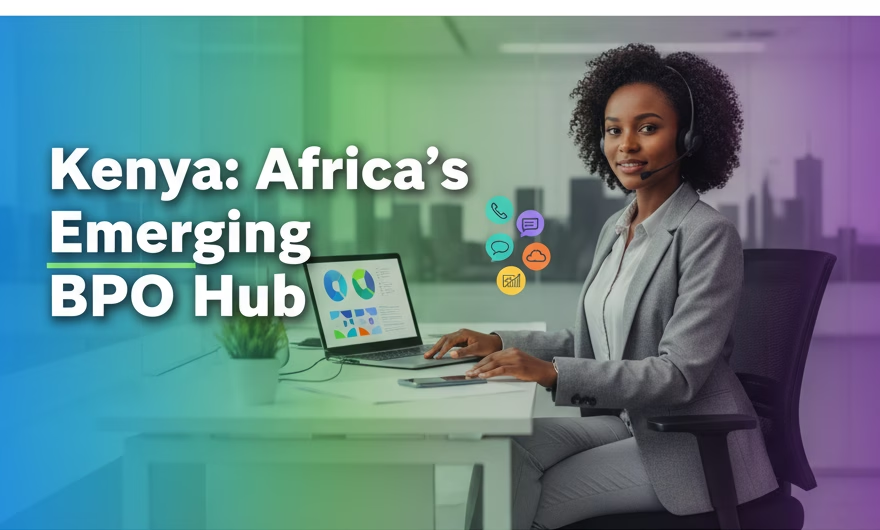Why Kenya Is Emerging as a BPO Hub
Kenya is increasingly touted as a rising hub for call center and BPO services, catching up with long-established competitors such as India and the Philippines. Guided by the national spirit of Harambee (“Let us all pull together”), the country has undergone steady economic and digital transformation over the past decade, accelerating enterprise modernization across sectors. African businesses have not been left behind—digitization and customer experience have become boardroom priorities, and Kenya’s blend of talent, connectivity, and business reform has positioned it firmly on the global outsourcing map.
Extending this momentum to the contact center industry, Kenya shows strong potential as a go-to destination for business process outsourcing. Since KenCall—Kenya’s first major call center—was founded by Nik Nesbitt in 2005, the ecosystem has matured considerably. Today, Kenya is competing for complex, multilingual customer operations, tech-enabled support, and back-office processes, driven by an educated, English-speaking workforce, improving infrastructure, and an innovation-minded policy environment.
A combination of factors underpin this trajectory and reinforce why global brands are evaluating Kenya for customer support, sales operations, and specialized BPO work:
- Skilled, English-speaking talent: Kenya’s large youth population, strong English proficiency, and growing pool of graduates create a robust pipeline for customer-facing roles, content moderation, technical support, and finance or compliance processing. Bilingual capabilities in English and Swahili also support pan-African and Middle East markets.
- Favorable time zone: Operating at GMT+3, Kenyan teams can serve Europe and the Middle East during regular business hours and overlap with North American shifts for 24/7 coverage—useful for follow-the-sun support models.
- Cost and value advantage: Competitive compensation levels, improving office infrastructure, and access to cloud technologies help deliver strong cost-to-quality ratios versus more mature outsourcing destinations.
- Reliable connectivity: Multiple subsea cables landing on the East African coast and expanding terrestrial fiber have improved bandwidth, availability, and redundancy. This has enabled cloud-first operations, remote or hybrid agent models, and real-time analytics.
- Supportive policy direction: Pro-innovation initiatives, special economic zones, and digital skills programs have cultivated a business-friendly environment. Kenya’s Data Protection Act (2019) and the Office of the Data Protection Commissioner (ODPC) provide a clearer framework for privacy and compliance-driven outsourcing.
- Vibrant tech ecosystem: Often dubbed the “Silicon Savannah,” Nairobi’s startup scene, fintech leadership, and growing data center footprint signal a maturing digital economy that enterprises can plug into for customer experience (CX) transformation.
What Modern CX Partners Must Deliver
These fundamentals matter because client expectations of modern contact centers have shifted. Today’s outsourced CX partners must deliver:
- Omnichannel engagement: Seamless voice, chat, email, social, and messaging connectivity to meet customers where they are—best enabled by an omnichannel contact center.
- Cloud-based scalability: Elastic capacity to handle seasonal spikes, new market launches, and work-from-anywhere models.
- Analytics and quality management: Speech and text analytics, real-time dashboards, and AI-assisted agent productivity and coaching.
- Security and compliance: Strong controls, data localization options where required, and adherence to sectoral regulations.
Kenya’s Evolving Contact Center Landscape
Kenya’s evolution since 2005 reflects these demands. Early providers focused on voice support for international clients; today, many teams manage omnichannel customer care, sales development, KYC verification, and content operations. Enterprises serving telecom, e-commerce, fintech, travel, logistics, ride-hailing, and healthcare increasingly look to Kenya for both front-office and back-office processes that require critical thinking and quality at scale.
Another development is the normalization of hybrid and distributed work. With cloud contact center platforms, secure VPNs, and workforce management tools, Kenyan BPOs can draw from a broader geographic talent pool while maintaining service levels. This flexibility also strengthens business continuity planning—critical for managing power or connectivity disruptions—through multi-site setups, generator-backed facilities, and multi-ISP redundancy.
Policy and infrastructure also play a defining role. The Kenya Data Protection Act (2019) established principles for lawful processing, consent, data subject rights, and cross-border transfers, aligning with global privacy standards and reassuring compliance-conscious industries. Meanwhile, ongoing investments in data centers and fiber allow contact centers to host applications locally, reduce latency, and deliver AI-powered services effectively. These developments, taken together, help Kenya present a credible, scalable, and secure outsourcing proposition.
On the talent front, universities, TVET institutions, and targeted programs have increased exposure to customer-centric and digital skills. Initiatives that connect youth to online work and gig opportunities have broadened employability pathways while giving graduates early exposure to customer experience workflows. Employers, in turn, invest in accent neutrality, soft skills, and product training to meet international benchmarks.
Kenya’s Differentiators vs. Established Markets
Importantly, Kenya’s value proposition is not identical to India or the Philippines; it is complementary. While those markets remain global leaders, Kenya increasingly stands out for:
- Regional hub positioning: The ability to serve East Africa, the wider African continent, the Middle East, and parts of Europe from a single hub.
- Cultural alignment and relationship-driven service: High emphasis on empathetic support and first-contact resolution, aided by strong communication skills.
- Agility and specialization: Faster setup cycles for pilot teams, specialized pods for fintech compliance, and tailored multilingual support for regional campaigns.
Key Considerations to Manage
There are, of course, considerations to manage. Power reliability, while improving, necessitates backups in critical sites. Talent retention requires clear career paths, robust coaching, and competitive benefits. CX leaders must also invest in quality frameworks—calibration routines, knowledge bases, and AI-assisted guidance—to maintain consistency across teams and channels. Where operations handle personally identifiable information (PII) or payment data, strict access controls and compliance audits are essential alongside adherence to the local data protection framework.
Is Kenya the New Call Center Capital?
Against this backdrop, the question, “Is Kenya the new call center capital?” is best answered pragmatically: Kenya has the ingredients to compete at a high level and is already delivering strong outcomes for diverse industries. Its trajectory points to continued growth in both scale and sophistication—especially for organizations seeking a resilient, cloud-first, and analytics-driven CX partner with strong English capabilities and pan-regional reach.
Evaluation Checklist for Decision-Makers
For decision-makers, the evaluation criteria remain straightforward:
- Define the scope of work (voice, chat, email, social, back office) and service hours by market.
- Prioritize security, compliance, and data-handling requirements—aligning with Kenya’s data protection rules and your sectoral regulations.
- Choose cloud-first platforms for faster deployment, omnichannel orchestration, and remote/hybrid workforce support.
- Insist on analytics, QA, and coaching frameworks to sustain performance and customer satisfaction.
- Plan redundancy—multi-site options, multi-ISP connectivity, and robust business continuity processes.
With these considerations, organizations can capture Kenya’s advantages while meeting global CX standards. The result is a future-ready contact center footprint that scales efficiently, delivers consistent quality, and adapts quickly to changing customer expectations.
Closing Thoughts
There is little doubt that Kenya has the potential to be a leading destination for call centers and broader BPO services. But the story does not end at market entry; it begins there. Once the business is established and teams are in place, you need one essential foundation—a modern call center software stack that unifies customer interactions, enables real-time visibility, and safeguards data.
Typically, there are two ways to set up a call center: on-premise or on-cloud. Given Kenya’s current phase of development and the pace of change in customer expectations, enterprises should carefully assess which deployment model best aligns with their goals:
- On-premise: Offers localized control and may suit highly regulated environments requiring strict on-site data handling. However, it demands higher upfront investment, longer deployment cycles, and dedicated IT resources to scale.
- Cloud contact center: Accelerates time-to-value with elastic capacity, built-in redundancy, and rapid feature updates. Cloud also makes it easier to launch omnichannel experiences, support distributed teams, and leverage AI for routing, assistance, and quality management.
For many organizations tapping Kenya’s talent and connectivity, a cloud contact center provides the agility to pilot quickly, refine processes with data, and scale confidently. As global brands diversify their CX locations and shift to analytics-led operations, Kenya is well placed to take its competitors head-on and emerge as a favored destination for the BPO and ICT industry—delivering quality, resilience, and customer-centric innovation at scale.




